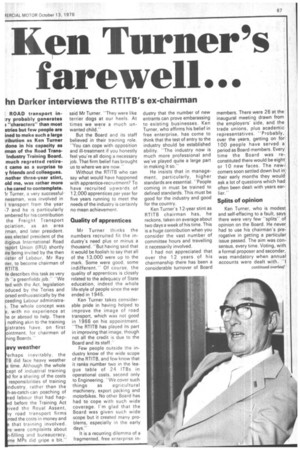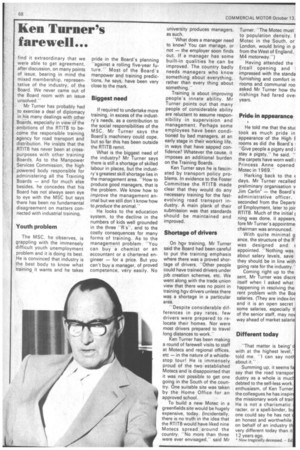Ken Turner's farewell•••
Page 69

Page 70

If you've noticed an error in this article please click here to report it so we can fix it.
hn Darker interviews the RTITB's ex-chairman
ROAD transport intry probably generates 3 "characters" than most stries but few people are ined to make such a large tribution as Ken Turner
done in his capacity as rman of the Road Trans Industry Training Board.
much regretted retireit came as a surprise to y friends and colleagues. ,nother three-year stint, old me, was rather more k he cared to contemplate. 1r Turner, a very successful' nessman, was involved in I transport from the year
and he is particularly embered for his contribution the Freight Transport ociation, as an area rman, and later president. vas elected president of the itigious International Road 'sport Union (IRU) shortly )re being invited by the then lister of Labour, Mr Ray 'ter, to become chairman of RTITB.
le describes this task as very "a greenfields job." "We ted with the Act, legislation oduced by the Tories and orsed enthusiastically by the eeding Labour administra The whole concept was , with no experience at e or abroad to help. There nothing akin to the training
istrates have, on first ointment, for chairmen of fling Boards.
avy weather
erhaps inevitably, the B did face heavy weather time. Although the whole ept of industrial training d for a sharing of the costs responsibilities of training industry, rather than the h-as-catch-can poaching of ed labour that had hapd before the Training Act ived the Royal Assent, y road transport firms nted the costs in money and that training involved. re were complaints about -filling and bureaucracy. me MPs did gripe a bit," said Mr Turner. "They were like terrier dogs at our heels. At times we were a much unwanted child."
But the Board and its staff believed in their training role. "You can cope with opposition and ill-treatment if you honestly feel you're all doing a necessary job. That firm belief has brought us to where we are now."
Without the RTITB who can say what would have happened with apprentice-recruitment? To have recruited upwards of 12,000 apprentices per year for five years running to meet the needs of the industry is certainly no mean achievement.
Quality of apprentices
Mr Turner thinks the numbers recruited fit the industry's need plus or minus a thousand. "But having said that it would be foolish to say that all of the 13,000 were up to the mark. Some were good, some indifferent." Of course, the quality of apprentices is closely related to the adequacy of State education, indeed the whole life-style of people since the war ended in 1945.
Ken Turner takes considerable pride in having helped to improve the image of road transport, which was not good in 1966 on his appointment. "The RTITB has played its part in improving that image, though not all the credit is due to the Board and its staff."
Few people outside the industry know of the wide scope of the RTITB, and few know that it ranks number two in the league table of 24 ITBs in operational costs, second only to Engineering. "We cover such
things as agricultural machinery, export packing and motorbikes. No other Board has had to cope with such wide coverage. I'm glad that the Board was given such wide scope but it created many problems, especially in the early days."
It is a recurring dilemma of a fragmented, free enterprise in
dustry that the number of new entrants can prove embarassing to existing businesses. Ken Turner, who affirms his belief in free enterprise, has come to think that the test of entry to the industry should be established ability. "The industry now is much more professional and we've played quite a large part in making it so."
He insists that in management, particularly, higher standards are essential. "People coming in must be trained to defined standards. This must be good for the industry and good for the country.
Ken Turner's 12-year stint as RTITB chairman has, he reckons, taken on average about two days a week of his time. This is a huge contribution when you consider the vast number of committee hours and travelling it necessarily involved. • I had not appreciated that over the 12 years of his chairmanship there has been a considerable turnover of Board members. There were 26 at the inaugural meeting drawn from the employers' side, and the trade unions, plus academic representatives. "Probably, over the years, getting on for 100 people have served a period as Board members. Every time the Board was reconstituted there would be eight or 10 new faces. The newcomers soon settled down but in. their early months they would ask a lot of questions which had often been dealt with years earlier."
Splits of opinion
Ken Turner, who is modest and self-effacing to a fault, says there were very few "splits" of opinion on the Board. He never had to use his chairman's prerogative in getting a particular issue passed. The aim was consensus, every time. Voting, with a formal proposer and seconder, was mandatory when annual accounts were dealt with. "I find it extraordinary that we were able to get agreement, after discussion, on many points of issue, bearing in mind the mixed membership, representative of the industry, of the Board. We never came out of the Board room with an issue unsolved."
Mr Turner has probably had to exercise a deal of diplomacy in his many dealings with other Boards, especially in view of the ambitions of the RTITB to become the responsible training agency for road transport and distribution. He insists that the RTITB has never been at crosspurposes with other training Boards. As to the Manpower Services Commission, the high powered body responsible for administering all the Training Boards — and for much else besides, he concedes that his Board has not always seen eye to eye with the MSC but says there has been no fundamental disagreement on matters connected with industrial training.
Youth problem
The MSC, he observes, is grappling with the immensely difficult youth unemployment problem and it is doing its best. He is convinced that industry is the best body to know what training it wants and he takes pride in the Board's planning ''against a rolling five-year future.'" Most of the Board's manpower and training predictions, he says, have been very close to the mark.
Biggest need
If required to undertake more training, in excess of the industry's needs, as a contribution to the social responsibilities of the MSC, Mr Turner says the Board's machinery could cope, but so far this has been outside the RTITB remit.
What is the biggest need of the industry? Mr Turner says there is still a shortage of skilled labour in places, but the industry's greatest skill shortage lies in the management area, "How to produce good managers, that is the problem. We know how to improve the management animal but we still don't know how to produce the animal."
He looks to the education system, to the decline in the numbers of kids well grounded in the three "R's", and to the costly consequences for many forms of training. As to the management problem "You can buy a chemist or an accountant or a chartered engineer — for a price. But you can't buy a manager, of proved competence, very easily. No university produces managers, as such.
"What does a manager need to know? You can manage, or not — the employer soon finds out. If a manager has some built-in qualities he can be improved. The country badly needs managers who know something about everything, rather than every thing about something."
Training is about improving people's innate ability. Mr Turner points out that many people of considerable ability are reluctant to assume responsibility in supervision and management. Perhaps some employees have been conditioned by bad managers, at an early stage in their working life, in ways that have sapped confidence? Whatever the cause, it imposes an additional burden on the Training Boards.
Ken Turner says he is fascinated by transport policy problems. In evidence to the Foster Committee the RTITB made clear that they would do any necessary training for the fastevolving road transport industry. A main plank of their submission was that standards should be maintained and improved.
Shortage of drivers
On hgv training, Mr Turner said the Board had been careful to put the training emphasis where there was a proved shortage of drivers. "Other people could have trained drivers under job creation schemes, etc. We went along with the trade union view that there was no point in training hgv drivers unless there was a shortage in a particular area.
"Despite considerable differences in pay rates, few drivers were prepared to relocate their homes. Nor were most drivers prepared to travel long distances to work.
Ken Turner has been making a round of farewell visits to staff at Motecs and regional offices, etc — in the nature of a whistlestop tour! He is immensely proud of the two established Motecs and is disappointed that it was not possible to get one going in the South of the country. One suitable site was taken by the Home Office for an approved school.
To build a new Motec in a greenfields site would be hugely expensive, today. (Incidentally, there is no truth in the idea that the RTITB would have liked nine Motecs spread around the country. "No more than three were ever envisaged,said Mr
Turner. "The Motec must to population density. Motec in the South, or London, would bring in p from the West of England, M4 motorway.") Having attended the Ercall opening and impressed with the standa furnishing and comfort in rooms and communal roo asked Mr Turner how th( nishings had fared ove years.
Pride in appearance He told me that the stut took as much pride in appearance of the High E rooms as did the Board's -Give people a pigsty and i stay a pigsty," he said. " the carpets have worn well : Princess Anne opened Motec in 1969."
Harking back to the days, Mr Turner recalled preliminary organisation v Jim Carlin — the Board's administrative officer, seconded from the Departr of Employment, later to joir RTITB. Much of the initial I ning was done, it appears, fore Mr Turner's appointme chairman was announced.
With quite minimal g ance, the structure of the R' was designed and appointed. "Nothing was about salary levels, save they should be in line with going rate for the industry.'
Coming right up to the sent, Mr Turner was discrE itself when I asked what happening in resolving the rent problem with the Boa salaries. (They are index-lin and it is an open secret some salaries, especially t of the senior staff, may no way ahead of market salarie
Different today
"That matter is being' with at the highest level, told me. "I can say not about it."
Summing up, it seems f say that the road transpor dustry as a whole is muc debted to the self-less work, enthusiasm, of Ken Turner the colleagues he has inspir the missionary work of trai He is not a charismatic racter, or a spell-binder, b one could say he has not an honest and worthwhile on behalf of an industry th very different today than it 12 years ago.
Now tragicat/y deceased. Ed
























































































































































































































